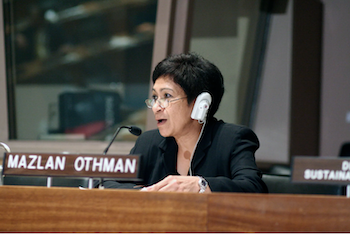
Emerita Professor Tan Sri Dato’ Seri Dr. Mazlan binti Othman is Malaysia’s first astrophysicist, pioneering the nation’s entry into space exploration. She contributed to the understanding and expansion of astrophysics on a national and international scale, serving Malaysia’s national space agency and the United Nations (UN). In addition, she has been awarded numerous honors, titles, and awards for her work in the field. Today, she continues to raise awareness and understanding of astronomy, paving the way for women in STEM.
Born on the 11th of December 1951 in Seremban, Mazlan was the 9th of her parents’ 13 children. At the time, her father was studying agriculture in Christchurch, and worked in agriculture, while her mother was a stay-at-home parent. Growing up, her family moved around often until her father was assigned to the ministry in Petaling Jaya. There, Mazlan attended an elite girls’ boarding school, Kolej Tunku Kurshiah, in the heart of the town. She had a flair and love for mathematics, leading her to enroll in a science curriculum after her teachers steered her towards science. Mazlan was an outstanding student, winning prizes for physics, English, and track. After high school, she was encouraged by her family and friends to pursue medicine, especially since physics was considered a male dominated subject then. However, Mazlan had different plans, choosing to study physics at the University of Otago in New Zealand on a Colombo plan scholarship. Her love for astrophysics grew when she discovered it in her junior year. In 1975, she graduated with honors and returned to Malaysia, where she became a tutor at Universiti Kebangsaan Malaysia (UKM), the National University of Malaysia. Soon after, Mazlan received an extension to her scholarship, bringing her back to her alma mater to earn a Ph.D in astrophysics in 1981. Furthermore, Mazlan was the first woman to hold a Ph.D from the University of Otago since 1869, when the university was founded. After settling in her career, she attended the Advanced Management Programme (AMP169) at Harvard Business School in 2005.
Upon earning her doctorate, Mazlan returned to Malaysia as the nation’s first astrophysicist, thus beginning her academic career. In the same year, she started off as a lecturer in UKM, specializing in astrophysics. At the same time, she conducted research and built a national curriculum in astrophysics. With little information on the unconventional field and less than 2000 astrophysicists, Mazlan faced discouragement from those around her. Despite this, she persevered with support from her colleagues abroad. Mazlan gained sponsors to go overseas to conduct research, giving her the opportunity to work at the Kiso Observatory in Japan for a semester. Additionally, she managed to earn grants to conduct personal research, allowing her to publish academic research papers in her field. Her colleagues also gifted her books to aid her with creating an undergraduate and postgraduate curriculum in astronomy and astrophysics for her students.
Mazlan’s career switch from the academic world to public service and public education came from a change of heart. Although she dreamed of big wins and bigger discoveries, she decided that she wanted to make a difference in the world. With the lack of knowledge on astrophysics and astronomy among the general Malaysian population, Mazlan wanted to raise public awareness on space exploration and its importance. In 1990, she was appointed by Prime Minister Mahatir Mohamad to be in charge of the Planetarium Division of the Prime Minister’s Department. During her time in the position, Mazlan oversaw the development of the national planetarium (Planetarium Negara), which officially opened 3 years later. The planetarium was used to preserve Malaysia’s history in space science, including permanent space science exhibits, a space theater, and a space theme park. After this, she became Director General of the newly-established government division of Space Science Studies. Through this, Mazlan launched a microsatellite development program. It only took another year until she received full professorship.

However, her venture into public service through astrophysics did not end there. Mazlan served as the Director of the United Nations Office for Outer Space Affairs (UNOOSA) twice: once in 1999, and again in 2007 after being appointed by the Secretary-General of the UN. Notably, she is the first Malaysian to have been in this position. Based in Vienna, Mazlan worked and handled various issues regarding outer space, ranging from international co-operation in space to the use of space-based remote sensing platforms for sustainable development, and even coordination of space law. In June of 2009, Mazlan assumed the position of Deputy Director-General of the United Nations Office at Vienna (UNOV). While involved in the UN, she established the Basic Space Technology Initiative, targeted towards developing countries to build up their capacity and capabilities in space technology.
In 2002, in between her posts in Vienna, Mazlan was called home by the Prime Minister to head and lead Angkasa – the Malaysian National Space Agency – as the founding Director General. Throughout her 5 years serving as Director General, she was able to expand the field of astrophysics within Malaysia. For example, Mazlan established the National Observatory in Langkawi and the National Space Centre in Selangor, building the infrastructure for rockets and satellites. To achieve the Malaysian dream of going to space, she worked alongside the Ministry of Defence to plan the National Angkasawan (Astronaut) Programme. As the head of the program, Mazlan helped the nation launch the first Malaysian astronaut to the International Space Station: Dr. Sheik Muszaphar Shukor. She also helped with the creation and launch of 2 Malaysia Remote Sensing Satellites: TiungSAT and RazakSAT. In fact, RazakSAT is the world’s first remote-sensing satellite in near-Equatorial orbit.
In 2013, Mazlan retired from the United Nations, moving on to other advisory roles on committees and boards in astrophysics and STEM in general. For instance, she became the Project Director, Mega Science 3.0 at the Academy of Science Malaysia (ASM) from 2014-2016. The Mega Science 3.0 Project aimed to paint the bigger picture of science and technology, zooming in on the countless industries and using data to project the future in 2050. This was to lay out the nation’s priorities to build strategies, ideas, and plans for success. At the end of her run as the Project Director, she was elected as a Senior Fellow of ASM.
Besides that, Mazlan was awarded the honor of Professor Emeritus at UKM in 2015. She was a Fulbright Scholar at the Space Policy Institute of George Washington University from 2015-2016, earning a research grant. Furthermore, Mazlan was the Director of the International Science Council (ISC) Regional Office for Asia and the Pacific (ROAP) from 2017 to 2021. As of last year, she is a non-executive member of Hong Kong Aerospace Technology Group (HKATG), which is a funded satellite program. HKATG is the leading space enterprise in Hong Kong, mainly focusing on satellite manufacturing and space education, where Mazlan helps with her expertise. Aside from that, Mazlan is on the council of the Off-World Approach: a program launched by the Hague Institute of Global Justice to examine future space enterprise as well as the role of civil society.

Due to her contributions to astrophysics, Mazlan has received numerous honors and titles. She was granted the honorific “Datuk” by His Majesty Yang Di Pertuan Agong of Malaysia in the 1997 Agong’s honors list. In the same year, her alma mater awarded her an honorary degree – the degree of Honorary Doctor of Science. In 2009, Mazlan was awarded the President’s Medal from the Institute of Physics for her national and international role in space science; in 2013, she received the “Polarstern-Preis” (Polarstar Award) from the Austrian Space Forum. Now, she is a Senior Fellow of ASM, Fellow of the Institute of Physics, Fellow of the Royal Astronomical Society, and Fellow of the Malaysian Scientific Association.
Today, Mazlan continues to highlight the need to encourage young girls to pursue science in the face of “glass ceilings” such as gender norms, traditional upbringings, and skewed perceptions that STEM careers are less rewarding. She emphasizes that parents and teachers play a huge role in transforming the next generation’s mindset and invoking scientific curiosity. Mazlan hopes for more visibility of women in science, leading their respective fields. As a role model to young women across Malaysia and the rest of the globe, her story remains as proof that it is possible to break through the barriers. Currently, Mazlan is an active speaker at conferences and finances new ideas in science for younger scientists.
After long decades of working towards understanding and reaching milestones in astrophysics, Mazlan has retired to be with her family: her husband, Prof. Emeritus Datuk Dr. Ibrahim Komoo, son, daughter, and 2 grandchildren, now living with her daughter in Kuala Lumpur. While she has mostly retired from the space industry, her love for it never wilted. Last year, in 2023, she just published a book – ‘Cosmic Connections Langkawi’ – that highlights photos taken from the Langkawi National Observatory. Every now and then, she actively speaks at science conventions and conferences.
Why Did I Choose to Research Emerita Professor Tan Sri Dato’ Seri Dr. Mazlan binti Othman?
Researching Dr. Mazlan was a decision I made because I wanted to discover the many many women in my own country that have achieved great heights, that have overcome the glass ceiling, that have become the first and the best in their field. In the STEM field that is extremely male-dominated, it is refreshing to study a woman who pioneered it. As a girl who intends to enter the same field very soon, it is worth discovering and remembering that Dr. Mazlan is one of the women who made it possible for us, who stood as a reminder that women belonged in STEM just as much as men.
Works Cited
12 Malaysian women who smashed the glass ceiling. (2016, March 7). Prestige Online - Malaysia. https://www.prestigeonline.com/my/people/12-malaysian-women-who-smashed-the-glass-ceiling/
Bakar, Z.A. (2015) ‘Professor Emeritus Datuk Dr. Mazlan Othman discusses science and the future’, Perdana Magazine. Available at: https://viewer.joomag.com/perdana-magazine-2014-2015/0090993001458179445/p32?short&
Federation, I.A. (no date) Mazlan binti Othman, IAF. Available at: https://www.iafastro.org/biographie/mazlan-binti-othman.html#:~:text=School%20in%202005.-,Dr.,United%20Nations%20in%20December%202013
Huda, A. (2024) ‘Malaysia’s first astrophysicist empowers girls in https://www.freemalaysiatoday.com/category/nation/2024/02/15/malaysias-first-astrophysicist-empowers-girls-in-stem-fields/
Kong, W.Y. (2024) ‘IWD 2024 recap: Looking up to relatable role models can inspire struggling career women to forge ahead’, Options, The Edge, 2 April. Available at: https://www.optionstheedge.com/topic/people/iwd-2024-recap-looking-relatable-role-models-can-inspire-struggling-career-women-forge
Mazlan binti Othman (no date) Mazlan Binti Othman | Fulbright Scholar Program. Available at: https://fulbrightscholars.org/grantee/mazlan-binti-othman
Ong, L. (2018) ‘Future Vs Fiction: Astrophysicist Datuk Mazlan Othman Reflects On A Life Dedicated To Science’, Tatler Asia, 6 October. Available at: https://www.tatlerasia.com/the-scene/people-parties/astrophysicist-mazlan-othman-unoosa-space-angkasa
Samsung Teams Up With Dr Mazlan To Provide Quality Education To Underprivileged Kids. (n.d.). News.samsung.com. Retrieved July 28, 2024, from https://news.samsung.com/my/samsung-teams-up-with-dr-mazlan-to-provide-quality-education-to-underprivileged-kids
Secretary-general appoints Mazlan Othman director of Office for Outer Space Affairs (no date) United Nations : Information Service Vienna. Available at: https://unis.unvienna.org/unis/en/pressrels/1999/bio533.html
Tan, G.E. (2023) ‘Malaysia’s first astrophysicist Professor Emerita Tan Sri Dr Mazlan Othman talks space exploration’, Options, The Edge, 24 January. Available at: https://www.optionstheedge.com/topic/people/malaysias-first-astrophysicist-professor-emerita-tan-sri-dr-mazlan-othman-talks-space
The off-world approach archives (no date) The Hague Institute for Global Justice. Available at: https://thehagueinstituteforglobaljustice.org/portfolio-category/off-world-approach/
This article was published on 8/19/24